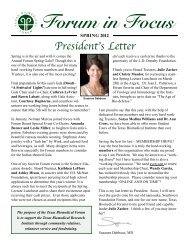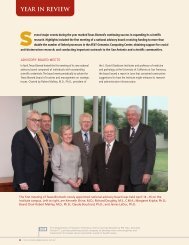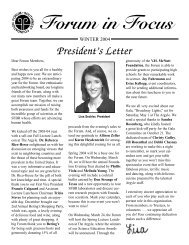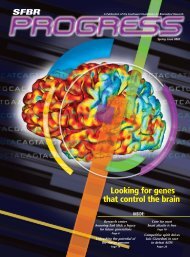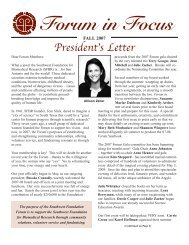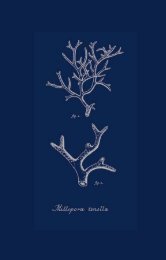Texas Biomed Science Report 2011-2012 - Texas Biomedical ...
Texas Biomed Science Report 2011-2012 - Texas Biomedical ...
Texas Biomed Science Report 2011-2012 - Texas Biomedical ...
You also want an ePaper? Increase the reach of your titles
YUMPU automatically turns print PDFs into web optimized ePapers that Google loves.
Letter from the<br />
President<br />
Dear Friends and Colleagues,<br />
I am very pleased to share with you the <strong>2011</strong>-12 biennial<br />
Scientific <strong>Report</strong> for the <strong>Texas</strong> <strong>Biomed</strong>ical Research Institute,<br />
formerly known as the Southwest Foundation for <strong>Biomed</strong>ical<br />
Research. We changed our name effective February 1, <strong>2011</strong><br />
to better identify what we do and to avoid confusion with<br />
our sister institution, the Southwest Research Institute.<br />
We hope this summary of research activities will be helpful<br />
to other academic organizations, scientists and scientists-intraining,<br />
pharmaceutical and biotechnology companies who may<br />
wish to interact with our researchers or utilize our non-human<br />
primate colonies, community leaders, federal agency personnel,<br />
and public officials. This publication is not intended to replace<br />
our Annual <strong>Report</strong>, which is focused on a broader audience,<br />
but to supplement our communications with individuals,<br />
groups and organizations who should know about our research<br />
efforts and unique combination of scientific resources.<br />
<strong>Texas</strong> <strong>Biomed</strong> has been an extraordinary source of intellectual<br />
capital for seven decades. The basic and translational research<br />
efforts here have deepened our understanding of the genetics of<br />
complex disorders, virally-induced diseases, normal physiology<br />
and many of the aberrations that lead to disease. All of this<br />
work is facilitated by large colonies of non-human primates,<br />
an extraordinary computer “ranch” of 8,000 processors that<br />
analyze genetic data, the most secure of bio-containment<br />
research environments, and human population studies that<br />
every day lead to remarkable insights into the pathogenesis of a<br />
variety of life-altering and life-threatening human illnesses.<br />
All of these activities are undertaken in the organizational<br />
setting of an independent, not-for-profit research institution.<br />
This permits us to take prompt advantage of new scientific<br />
opportunities, infusions of government and philanthropic support,<br />
and the wonderfully collaborative environment of San Antonio.<br />
We take our role as a pioneer in biomedical research in<br />
this region very seriously, and I hope this <strong>Report</strong> reflects<br />
that. When Tom Slick courageously founded this institution<br />
in December, 1941, there was no medical school in San<br />
Antonio, no university hospital, no University of <strong>Texas</strong> at<br />
San Antonio. There was just one important asset, the vision<br />
of a man who believed profoundly that basic research could<br />
change the world and advance the interests of humankind.<br />
Each day, we try to emulate and reinforce that vision … that<br />
extraordinary spirit. We reach out not just to this city, this region,<br />
or even to the United States, but to the world-at-large. Disease<br />
outbreaks in the most remote regions of the globe can have<br />
<strong>2011</strong>–<strong>2012</strong> Scientific <strong>Report</strong><br />
“<strong>Texas</strong> <strong>Biomed</strong> has been an extraordinary source of<br />
intellectual capital for seven decades. The basic and<br />
translational research efforts here have deepened our<br />
understanding of the genetics of complex disorders,<br />
virally-induced diseases, normal physiology and<br />
many of the aberrations that lead to disease.”<br />
devastating impacts right here at home. Conversely, new discoveries<br />
here can transform the lives of people far from our borders.<br />
I invite you to read about our work and to share in our<br />
mission. Improving the health of our global community is<br />
not just what we stand for; it is what we do every day.<br />
Kenneth P. Trevett, JD<br />
San Antonio, <strong>2012</strong><br />
3



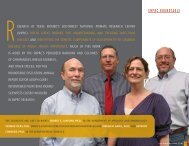
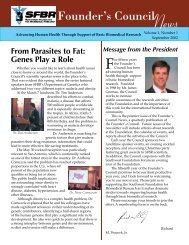
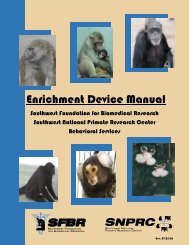
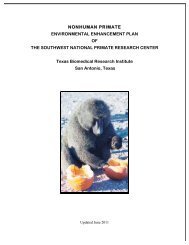
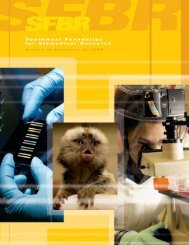
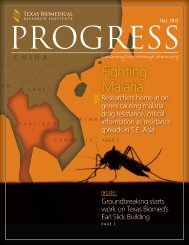
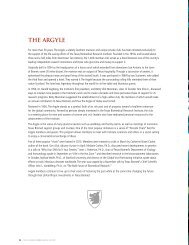
![Vol. 8 No. 2, 2011 [PDF] - Texas Biomedical Research Institute](https://img.yumpu.com/35688099/1/190x245/vol-8-no-2-2011-pdf-texas-biomedical-research-institute.jpg?quality=85)
